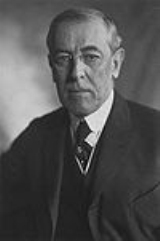
Woodrow Wilson
Thomas Woodrow Wilson was the 28th President of the United States, from 1913 to 1921. A leader of the Progressive Movement, he served as President of Princeton University from 1902 to 1910, and then as the Governor of New Jersey from 1911 to 1913...
Timeline of Events
|
1913
|
|
|||
|
1915
|
|
|||
|
1916
|
|
|||
|
1917
|
|
|||
|
1918
|
|
|||
|
1919
|
|

